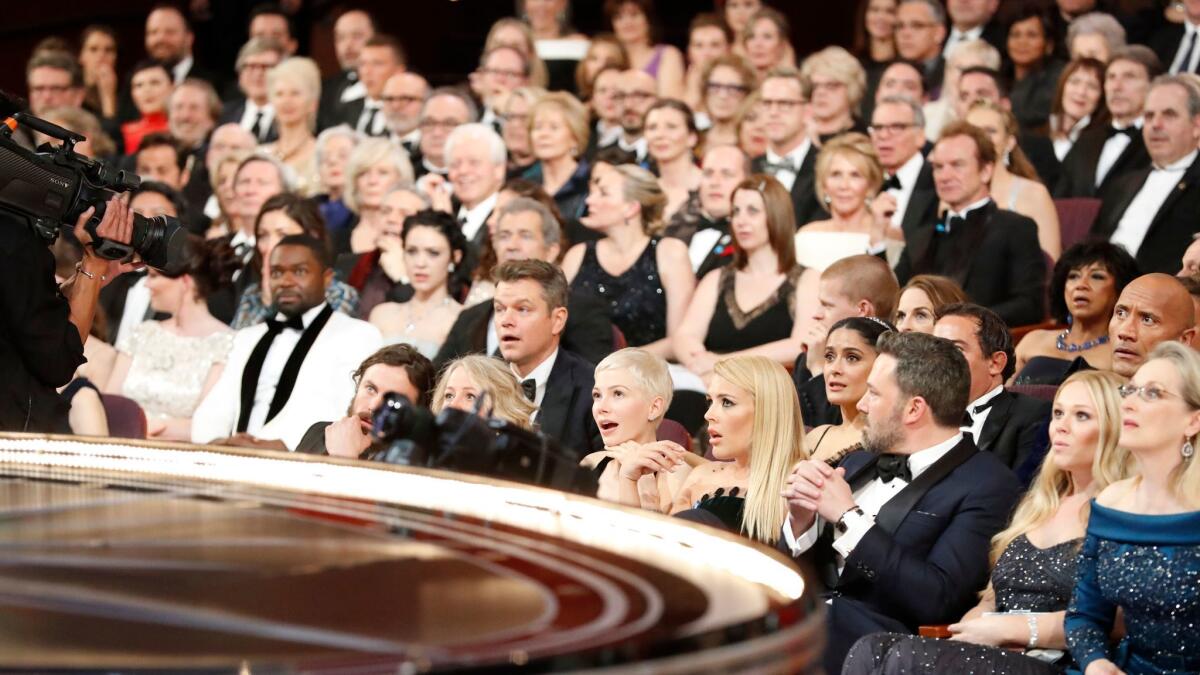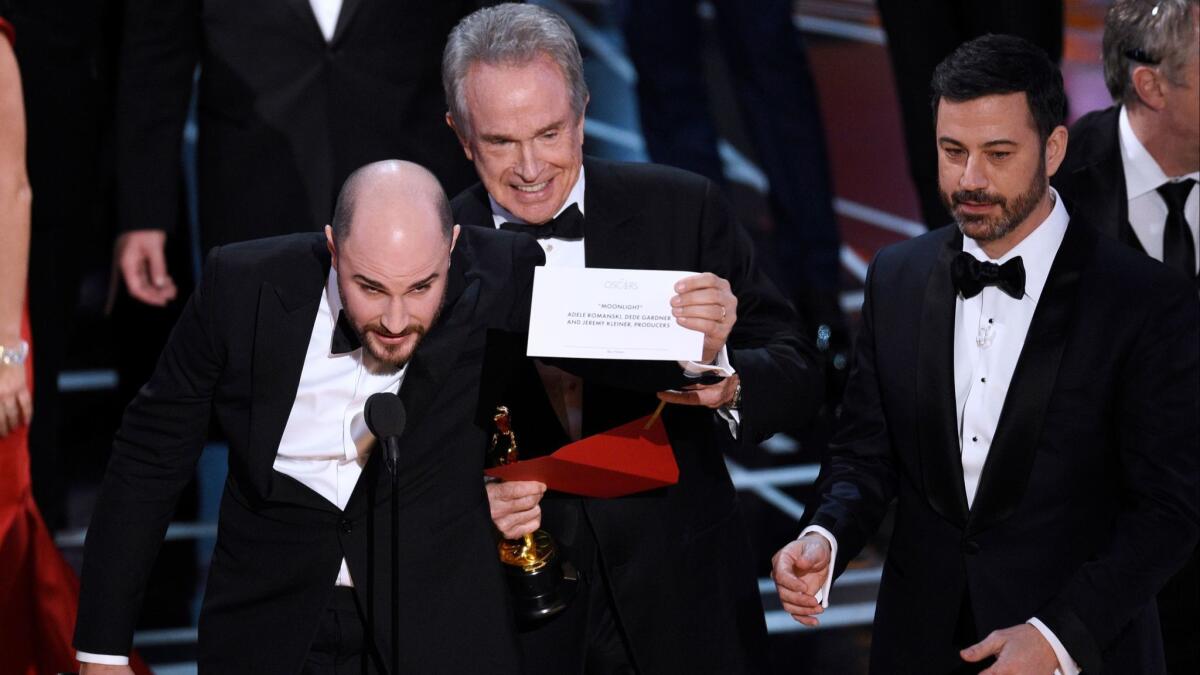Oscars production team looks back at last year’s snafu and ahead to this year’s show

- Share via
Rob Paine, supervising producer of the Academy Awards, remembers an urgent message — one that no one ever imagined they’d hear — coming over his headset: “It’s wrong! It’s wrong!”
Derek McLane, the Oscar telecast’s production designer, was seated in the audience at the Dolby Theatre and recalls the “murmur of confusion” that suddenly swept through the crowd.
Stationed in a production trailer behind the Dolby, the show’s announcer, Randy Thomas, remembers simply thinking, “What the …?”
Few who sat at home watching last year’s Oscars telecast are likely to soon forget the show’s shocking and chaotic final moments, in which “La La Land” was mistakenly announced as best picture over the actual winner, “Moonlight.” But for those who worked behind the scenes on the show’s production team, that epic snafu wasn’t just a crazy TV moment. It was a four-alarm disaster that played out on one of the world’s biggest stages, and, even as they prepare to turn the page with the 90th Oscars telecast next Sunday, it remains indelibly seared into their memory.
The best picture win for “Moonlight,” a low-budget, poetic indie about a gay black boy growing up in Miami, over the musical juggernaut “La La Land” was an upset in its own right. But the way in which that win unfolded turned what had otherwise been an amiable if somewhat predictable night into one of the most memorable shows in Oscar history and a reminder that in any live event — the Super Bowl, the presidential election — anything can happen.
For a film academy that had weathered two years of #OscarsSoWhite controversy and now finds itself trying to navigate the #MeToo moment, it was a singular crisis they could never have seen coming.
The show’s director, Glenn Weiss, is one of many members of that team returning to work on this year’s telecast, including producers Michael De Luca and Jennifer Todd. For Weiss, who earned a Directors Guild Award earlier this month for his work on last year’s show, the best-picture fumble and the nonstop coverage that followed dramatically illustrate the high stakes of mounting one of the most-watched live shows on television.
“The difference between doing the Oscars and other shows is not the mechanics of the job, it’s not the functions that you do every day, it’s the microscope the show is under,” said Weiss, who has also directed the Tony Awards and the Emmys, among other live broadcasts. “It’s scrutinized. It’s watched all over the world. Just looking at the red carpet and how many outlets are here, it’s something that is focused on and paid attention to within and without the industry.”

It’s easy to forget after the most stunning blunder in Oscars history, but as Weiss points out, the show had gone off without a hitch up until that final envelope was opened. Indeed, as the producers of “La La Land” took the stage to accept what they thought was their best picture award, the production team was preparing to bring the carefully choreographed telecast in for a smooth landing.
“I was about to tweet ‘That’s a wrap,’ ” says Thomas, who was the first woman ever hired by the academy to announce the Oscars – and will return this year for her ninth time.
When the show’s key stage manager Gary Natoli suddenly announced over the production’s internal communications system that a mistake had been made, it took a moment for some on the crew to wrap their heads around what he was saying.
“I couldn’t figure out what was supposedly wrong,” Paine said. “I thought Gary had lost his mind. I thought he was upset about the fact that ‘La La Land’ had won. Then I looked up and I saw him on camera — and, well, I don’t think you can print what we all said in the truck at that point.”
As the reality quickly sank in, Weiss knew that he had to let the audience see what was happening in real time with complete transparency. No matter how awkward or embarrassing it might be, there would be no cutting to a commercial, no breaking away for “technical difficulties.”
“In the world of live television, mishaps happen, and reflexively, instinctively you go wide, you cut away, you do what you can not to show it,” Weiss said. “In this case, it had to play the opposite way. I don’t care that suddenly there’s a guy in a headset onstage now, I don’t care that suddenly the accountants are on stage. What we need to do is make sure that we’re not accused of covering anything up.”
When “La La Land” producer Jordan Horowitz held up the right card showing that “Moonlight” was indeed the winner, Weiss had a camera ready to zoom in on it, creating an image that became an instant viral meme.
“I’ve been joking about the fact that I’ve spent a whole career staging breathtaking, beautiful moments on television, and the shot that I’ll be remembered for is a guy holding a card,” Weiss says. “But I have to thank Jordan. Not only did he handle this so graciously — and I’m not sure everybody would have in this situation — but he gave us the opportunity to get that shot.”
Taryn Hurd, who is returning this year for her fifth time as the show’s talent producer, was seated next to De Luca and Todd as the shock waves spread backstage. As the person on the production team responsible for booking and taking care of the show’s presenters, she felt particularly awful for Faye Dunaway and Warren Beatty, who had been handed the wrong envelope by a PricewaterhouseCoopers accountant and were left holding the bag.
“It broke my heart for them,” said Hurd. “Obviously, as we all know now, it had absolutely nothing to do with them and was not in any way their fault, but they were the faces of it. Once it all unfolded on stage and everyone came back, there was definitely a feel of, like, ‘OK, let’s take stock.’ All of us were just trying to figure out how that happened so we could get ahead of it because we knew the kind of story it was going to be.”
Looking ahead to this year’s show, the production team is confident that sort of freak bungle won’t happen again. New procedures have been put in place to further guard against such a mix-up, and the PricewaterhouseCoopers officials who handled last year’s envelopes have been replaced. While it’s safe to predict that returning host Jimmy Kimmel will make a joke or two about it, the hope is that the audience can shift its focus back to the movies.
“The most important thing is to remember that it’s about the movies,” said returning head writer Jon Macks, who has worked on 20 previous Oscars telecasts.
“At the end of the day we can’t control what someone at a microphone is going to say. Our focus is to celebrate 90 years of a great industry.
— Glenn Weiss
With the show now just days away, the production team is keenly intent on preserving as many surprises as possible. But given that 90th ceremony milestone, you can expect the telecast to be steeped in the history of Hollywood and Oscar shows of the past.
“When I grew up watching the show, and in my early days on the show, the musical numbers used to be very large and extravagant,” said Paine, who has been a part of the Oscars production team for more than 20 years. “I think there will be a few of those moments this year.”
“We took an extra-careful look at the history of the Oscars as an event, really looking at what its roots were as a show to see if there were any ways to honor that on this occasion,” said McLane, who says the driving visual motif of this year’s set design is “light and reflectivity.”
“There are things that are both reminiscent of some of the shows from the past, but there’s also a lot of stuff that I hope will feel very contemporary and modern and forward-thinking.”
Of course, this has been no ordinary year in Hollywood, as the industry has been rocked for months by ongoing sexual harassment scandals. Earlier this year, last year’s lead actor winner Casey Affleck, who has faced allegations of inappropriate behavior toward two women, withdrew from presenting the lead actress award at this year’s show. (“I’m not really at liberty to talk about that one,” Hurd says.) Beyond that, while there’s no doubt the #MeToo movement will be represented in the show, how exactly that unfolds remains to be seen.
“At the end of the day we can’t control what someone at a microphone is going to say,” Weiss said. “But our focus is to celebrate 90 years of a great industry, and there is so much to work with with that. We want to keep it positive and stay on that message.”
As for last year’s chaotic conclusion, Weiss can even see the positive in that at this point.
“When people come up to me at parties and ask the question, the first thing I say to them is, ‘Can you tell me right now, without taking out your phone, who won best picture three years ago?’ ” he said. “And nobody can name it. I think ‘Moonlight’ will be remembered. I don’t wish this on anyone, but the upside for them at least is there’s notoriety in some way.”
Twitter: @joshrottenberg
More to Read
Only good movies
Get the Indie Focus newsletter, Mark Olsen's weekly guide to the world of cinema.
You may occasionally receive promotional content from the Los Angeles Times.











